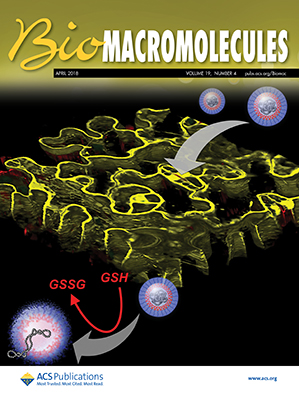Intracellular Nanodelivery of DNA with Enzyme-Degradable and pH-Responsive Peptide Dendrons
IF 5.5
2区 化学
Q1 BIOCHEMISTRY & MOLECULAR BIOLOGY
引用次数: 0
Abstract
Effective DNA delivery requires functional materials to package and transport genetic cargo into cells. However, many synthetic systems rely on heterogeneous mixtures, lack biodegradability, and pose toxicity concerns. Here, we introduce a peptide dendron single-molecule transfection reagent that enables targeted DNA delivery via pH-responsive, degradable nanoparticles with minimal toxicity. Peptide dendrons for intracellular delivery (PDIDs) incorporate ionizable non-natural amino acids for DNA binding and pH sensitivity. PDIDs formed stable nanoparticles that released DNA upon lysosomal acidification, facilitating cytoplasmic entry and subsequent gene expression. Rationally designed triamino acid blocks promoted protease degradation, reducing toxicity in preclinical models. Targeting ligands further enhanced the transfection efficiency by increasing cell uptake. In a lung metastasis model, targeted PDID-DNA nanoparticles selectively delivered therapeutic gene cargo to the lung, reducing tumor burden and extending survival. This platform demonstrates the potential to integrate natural and non-natural peptide features to enable safe and efficient DNA delivery in vivo.
- Download: Download high-res image (125KB)
- Download: Download full-size image
酶降解和ph响应肽树突的细胞内纳米DNA递送。
有效的DNA传递需要功能材料来包装和运输基因货物到细胞中。然而,许多合成系统依赖于非均质混合物,缺乏生物降解性,并且存在毒性问题。在这里,我们介绍了一种肽树突单分子转染试剂,可以通过ph响应,可降解的纳米颗粒以最小的毒性靶向DNA传递。用于细胞内递送(PDIDs)的肽树突包含可电离的非天然氨基酸,用于DNA结合和pH敏感性。pdid形成稳定的纳米颗粒,在溶酶体酸化时释放DNA,促进细胞质进入和随后的基因表达。合理设计的三氨基酸阻断剂促进蛋白酶降解,降低临床前模型的毒性。靶向配体通过增加细胞摄取进一步提高转染效率。在肺转移模型中,靶向PDID-DNA纳米颗粒选择性地将治疗性基因货物运送到肺部,减少肿瘤负担并延长生存期。该平台展示了整合天然和非天然肽特征的潜力,以实现体内安全有效的DNA传递。
本文章由计算机程序翻译,如有差异,请以英文原文为准。
求助全文
约1分钟内获得全文
求助全文
来源期刊

Biomacromolecules
化学-高分子科学
CiteScore
10.60
自引率
4.80%
发文量
417
审稿时长
1.6 months
期刊介绍:
Biomacromolecules is a leading forum for the dissemination of cutting-edge research at the interface of polymer science and biology. Submissions to Biomacromolecules should contain strong elements of innovation in terms of macromolecular design, synthesis and characterization, or in the application of polymer materials to biology and medicine.
Topics covered by Biomacromolecules include, but are not exclusively limited to: sustainable polymers, polymers based on natural and renewable resources, degradable polymers, polymer conjugates, polymeric drugs, polymers in biocatalysis, biomacromolecular assembly, biomimetic polymers, polymer-biomineral hybrids, biomimetic-polymer processing, polymer recycling, bioactive polymer surfaces, original polymer design for biomedical applications such as immunotherapy, drug delivery, gene delivery, antimicrobial applications, diagnostic imaging and biosensing, polymers in tissue engineering and regenerative medicine, polymeric scaffolds and hydrogels for cell culture and delivery.
 求助内容:
求助内容: 应助结果提醒方式:
应助结果提醒方式:


